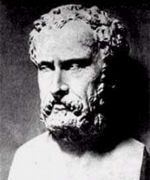Xenophanes of Colophon

Life and Work
Xenophanes (c.570-c.475 BC) was born in Colophon, an Ionian Greek city of Asia Minor. He emigrated in western Greece and he activated as a poet in Sicily and southern Italy. For this reason he was probably related to the Pythagorean School. He wrote especially didactic poetry and ‘Lampoons’ (Silloi): satirical poems in hexameters. Some verses of these poems survive from his work.
Religion Criticism
Xenophanes is well-known for his criticism of the traditional view-image of the Gods. In his poems he clearly attacks the Homeric and Hesiodic anthropomorphic descriptions of the divine deities. The image of the Gods is relative to the region and the culture which is expressed (black gods for the Africans, white gods for the Greeks). Such portrayals should be denied because of their subjectivity.
Single God
For Xenophanes there is one single god beyond any human or physical description. It is the greatest among the Gods without organs or body. This God is motionless, intelligent, with complete perception of the world, activating everything just by the sheer power of thought. It is this Xenophanes’ account of God that probably affects the Eleatic conception of the oneness and immobility of Being.
Cosmology
Xenophanes asserts that all natural phenomena are not divine deities but formations of material substances (the rainbow is not Iris but a special cloud formation). Earth stretch down ad infinitum and the horizontal border between air and earth is the only visible one. More significantly he distinguishes between divine knowledge and human opinion. Divine knowledge is the only true knowledge, while human opinion is totally subjective and probable. Xenophanes is aware that even his own views are only an assumption.
Fragments
10(11) Homer and Hesiod have attributed to the gods
everything that is blameworthy and disgraceful among humans
theft and adultery and mutual trickery.
12(14) ... but humans suppose that gods have been born
and wear clothes like theirs and have voice and body.
13(15) But if <horses> or cows or lions had hands
to draw with their hands and produce works of art as men do,
horses would draw the figures of gods like horses
and cows like cows, and they would make their bodies
just as the form which they each have themselves.
14(16) Ethiopians say that their gods are snub-nosed and black,
and Thracians that theirs have blue eyes and red hair.
16(18) Gods of course did not reveal everything to mortals from the beginning,
but in time by searching they improve their discoveries.
17(23) One god, greatest among gods and men,
not at all like mortals in body or mind.
18(24) As a whole he sees, as a whole he thinks and as a whole he hears.
19(26) And always he stays in the same place, not moving at all,
nor is it fitting for him to travel in different directions at different times..
20(25) But with no effort at all he keeps everything moving by the thinking of his mind.
21(29) Everything born and growing is earth and water.
22(27) For all things are from earth and into earth all things come to their end.
23(33) We all are generated from earth and water.
24(28) The upper limit of earth is seen here at our feet, in contact with air;
below it stretches on and on.
25(30) The sea is the source of water and the source of winds;
for without the great sea there would be <no winds>
nor flowing rivers nor rain from the sky, but the great sea
fathers clouds and winds and rivers.
26(32) And the one they call Iris even this is by nature a cloud,
purple and crimson and yellow to see.
28(38) If god had not made yellow honey, people would say
that figs are much sweeter.
29(35) Let these be accepted as opinions like the truth
31(34) And so no man has seen anything clearly nor will anyone know
about the gods and what I say about everything,
for if one should by chance speak about what has come to pass
even as it is, still he himself does not know, but opinion is stretched over all.
32(7) And they say that once as he was passing by when a puppy was being beaten
he took pity on it and spoke as follows:
'Stop! don't hit it! for it is the soul of a friend of mine,
which I recognised when I heard its voice'.
Translation M. R. Wright - note: numbers in parentheses refer to the standard Diels/Kranz order
Copyright 1997-2006
Giannis Stamatellos
E-mail: gstamap@yahoo.com
IONIANS
Thales of Miletus
Anaximander of Miletus
Anaximenes of Miletus
Heraclitus of Ephesus
Xenophanes of Colophon
PYTHAGOREANS
Pythagoras of Samos
Philolaus of Croton
Archytas of Tarantum
Alcmaeon of Croton
ELEATICS
Parmenides of Elea
Zeno of Elea
Melissus of Samos
PLURALISTS
Empedocles of Acragas
Anaxagoras of Klazomenes
Democritus of Abdera
BIBLIOGRAPHY
RELATED SOURCES